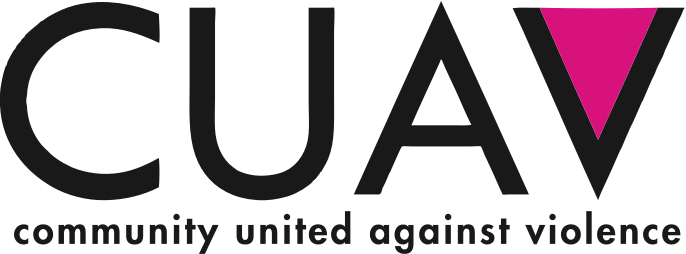About Us
Our Mission
Founded in 1979, CUAV works to build the power of LGBTQ (lesbian, gay, bisexual, transgender, queer) communities to transform violence and oppression. We support the healing and leadership of those impacted by abuse and mobilize our broader communities to replace cycles of trauma with cycles of safety and liberation. As part of the larger social justice movement, CUAV works to create truly safe communities where everyone can thrive.
“When I came to my groups in CUAV, I found people who have lived through the same type of violence. I have realized that the violence is not our fault.”
— CUAV Member
Our Vision
CUAV envisions a safe, resilient world where everyone can thrive. We live in powerful communities organized around collective liberation, not abuse or exploitation. Violence and trauma become opportunities to practice individual and collective transformation. Every living thing is valued as a vital part of a larger whole.
Our Values
Liberation
We believe that all forms of oppression and violence are interlocking and mutually enforcing. Therefore, our liberations are fundamentally connected. Our work seeks to build lives, relationships and communities organized around individual and collective possibility and self-determination for everyone.
Healing
The healing process opens doors to resilience and creativity. We believe that everyone has the seeds of healing within them. Our work seeks to build our individual and collective capacity to heal from all forms of violence and trauma.
Transformation
We seek to transform the individual, cultural and institutional conditions that support violence, and to transform ourselves along the way. This healing process engages individuals and communities in creating a safer, more just world.
Mutual Safety
We all deserve to be free from violence in our relationships and our communities. Our safety does not have to come at the expense of someone else’s safety.
Community
Supportive community helps us to connect and heal the isolation and shame that often accompanies trauma. We seek to create safer, healing communities where every member is valued and no one is disposable.
Leadership
The practice of leadership restores integrity and wholeness in the wake of trauma, and helps us take ownership over our own lives. We create opportunities for our communities to build solutions to the problems we face.
Our Analysis of Violence
There are three forms of violence and oppression. Learn about the levels of violence that exist internally (within ourselves), interpersonally (between people), and institutionally (between institutions and individuals).

